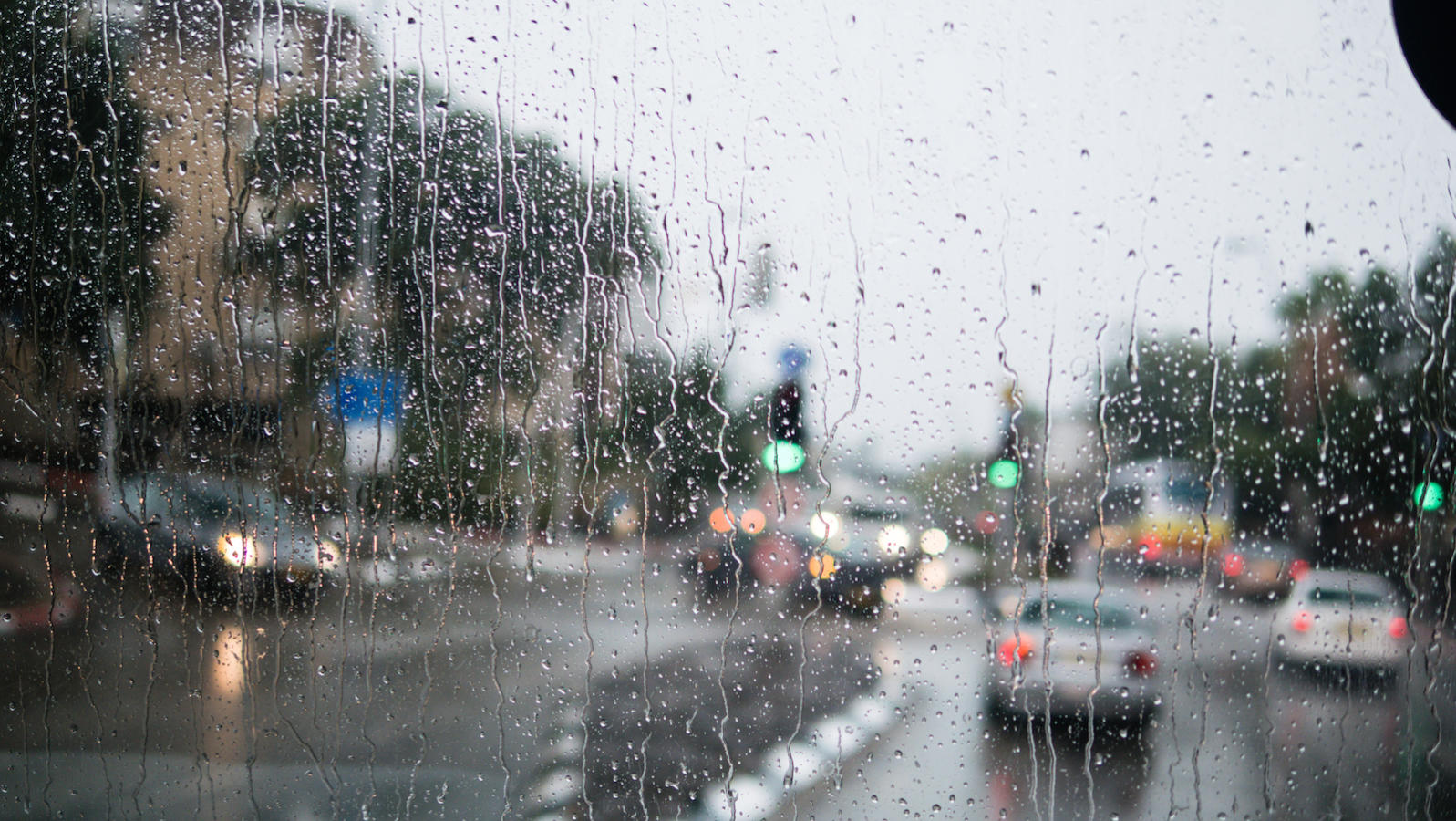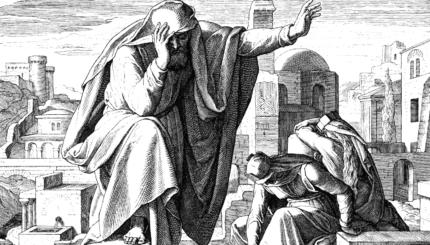Thank God for water! Without it we could not survive. On the holiday of Shemini Atzeret, which follows the festival of Sukkot, we make a special blessing for rain. We also begin mention in the daily prayers of God as the One who “makes the wind blow and the rain descend.” What does it mean for us to pray for rain? What does our praying for rain demand of us? And what role do rain and water play in our lives?
Water Nourishes Life
As we are well aware, water is essential to life. It nourishes us when we drink it, cook with it, or use it to irrigate our crops. It surrounded the world when God created the earth, and surrounds a fetus as it grows in its mother’s womb. Plants depend on water to produce energy in photosynthesis. That is why plants spring up around water. Just look at a satellite map of any river and you will see a lot of green vegetation on both banks of the river.
So we pray that the Divine bring rain that nourishes our crops and fills our reservoirs. Beneficial rain. At the right times. As the says in Masehet Ta’anit, “The day when rain falls is as great as the day on which heaven and earth were created” (8b). Or as Rabbi Levi ben Chiyata says in the , “Without rain earth could not endure” (Bereshit Rabbah, 13:3). In particular in the semi-arid land of Israel, water is a sign of its being a “good land” (see Deuteronomy 8:7).
God’s power is manifest in rain. The discusses why the Mishnah’s mention of rain in the second blessing of the Amidah is phrased as “the power of rain” and not just as “rain” (Ta’anit 2a). The Sages explain, based on a comparison between word usages in three verses, that rain comes down with power and reflects the power of God. The Midrash quotes Rabbi Hoshaiah as saying, “The power involved in making rain is as formidable as that of all of the works of creation” (Bereshit Rabbah 13:4). Rain is a tremendous force God has put into the world. Altering it in even small ways can have big effects on people and on the planet.

Help us keep Jewish knowledge accessible to millions of people around the world.
Your donation to My Jewish Learning fuels endless journeys of Jewish discovery. With your help, My Jewish Learning can continue to provide nonstop opportunities for learning, connection and growth.
In a number of instances God sent destructive rain due to people’s actions. In the generation of the flood, God brought rainwater on the generation of Noah to punish them for going against God’s will. The verse states, “Now the Flood was [upon the earth]” (Bereshit 7:2). Rashi explains, “But when He brought them [the rains] down, He brought them down with mercy, so that if they [the people] would repent, they [the rains] would be rains of blessing. When they did not repent, they became a flood.” Also, the prophet Samuel calls upon God to send destructive rain to punish the people (I Samuel 12:17). These cases show in the extreme the connection between how people act and the rains that come into the world.
Today, however, there is another aspect to the people-God-rain equation. While in the past God brought rains according to people’s actions, today our actions can affect the rains that God brings into the world. In short, we affect how rain affects us–at the local, regional, and global scale.
When we pray for rain, we hope that it will fill the rivers and reservoirs with clean water that we can drink. But with increasing urbanization in the world, land that once soaked up rainwater is being covered in pavement, which prevents absorption of the water. Think about how much rainwater in our city actually seeps into the earth, versus how much goes into gutters, storm drains, and then out to sea. Impacting large urban areas like Los Angeles, Phoenix and Atlanta, this new reality is also quite pronounced in Israel. As the Israel Environment Bulletin notes, “By 2020, the population [in Israel] is expected to reach some 8.4 million [people] and population density may reach 858 people per square kilometer north of Beersheba. By 2020, floor space per person in Israel is expected to reach 40 meters per person–double that [of] today.” (“Open Space in Israel,” Israel Environment Bulletin, vol. 29, Sept. 2005)In a matter of decades, a continuous urban settlement may likely stretch from the northern coast to the southern coast, from Nahariya to Ashkelon. More people and larger houses for those people translate into urban growth paving over much of the coastal plain.
It is rather contradictory to pray for beneficial rain and then pave over the land that would soak up the rain. The prayers for rain are specifically about rain in the land of Israel. We say, “God, please bring us rain,” and God does, but the rains descend on the central part of Israel with a significant amount of land paved so that a good part of the rains flow to the sea in drainage ditches and do not replenish the groundwater aquifers, needed for drinking water. Israel needs the ground to absorb this rain for our many uses; the ocean already has enough water!
In addition, by changing the climate, we may be changing the way some rains come down and bringing destructive rains on ourselves. Rain that once nourished us can end up harming us. By burning fossil fuels in our cars, homes, factories, and planes, we are increasing the carbon dioxide level in the atmosphere. This causes a “greenhouse effect” and raises temperatures in the oceans. According to a number of scientists, warmer oceans may be making hurricanes more intense and destructive, because hurricanes extract heat from the oceans at depths up to 100 meters. That is, more heat in the oceans means more heat that tropical storms draw up in creating energy in hurricanes. Examples of this not only may include Hurricane Katrina over New Orleans and other hurricanes over Florida and the Gulf Coast, but also more intense typhoon seasons in East Asia.
(Note that the link between ocean temperature and hurricane intensity is still a matter of scientific debate. Supporting the point made are Mann, M. E., and K. A. Emanuel, 2006: “Atlantic hurricane trends linked to climate change,” EOS, 87, 233-244. They state that “Anthropogenic [human-caused] factors are likely responsible for long-term trends in tropical Atlantic warmth and tropical cyclone activity.” Also see forthcoming article in Journal of Risk Analysis by Ken Bogen of the Lawrence Livermore National Laboratory, and Webster et al, “Changes in Tropical Cyclone Number, Duration, and Intensity in a Warming Environment,” 9-16-05, Science.
Here too it is a bit hypocritical to pray for rain and then alter our own global climate and sea temperatures so that hurricanes become more intense. We say, “God, please bring us rain,” and God does, by sending a moderate tropical storm towards Florida or China, which gains great intensity possibly due to warmer waters, and ends up tearing apart the crops and homes we wanted it to help.
Climate change may alter rain patterns in other ways, too. Global climate models project that climate change may increase precipitation by seven to fifteen percent at high latitudes, causing stronger and potentially more destructive storms in those areas. Climate change may decrease precipitation at mid- and low-altitudes, contributing to more severe regional droughts. (“Drought and Climate Change,” 2006, National Drought Mitigation Center.)
Helpful Tips on Water Use
There are a number of steps we can take so as not to thwart God’s blessing of rain. First, when God provides us with water, we can try to use it wisely. Rabbi Shmuel Simenowitz gives a number of helpful tips in his piece on water use and Jewish sources:
-Consider switching to a low flow toilet, which alone can save several thousand gallons of water annually.
-When doing dishes by hand, try not to use the faucet (or the sprayer) as a power washer–use the sponge to do this.
-Consider filling the sink or a dishtub with water, washing the dishes and then gently rinsing them off.
-Look into low flow shower heads, and think about taking shorter showers.
Second, if you are planning to build a house with a driveway, try using pervious concrete instead of regular concrete. The former allows rainwater to seep into the ground, instead of running off into drainage ditches and then the ocean. Third, we can be mindful of the ways we use energy, so as not to contribute unnecessarily to climate change and thus not impact the rains.
One of the challenges of living a life is being consistent. Hence Moses commands the Jewish people to “Be wholehearted with the Lord, your God” (Deuteronomy: 18:13). The Ramban understands this to be a positive commandment, one of the 613 mitzvot. Rav Shimshon Rafael Hirsch comments on this verse that: “We must not detach ourselves from God with even the smallest fiber of our lives; we must be with God in our entirety.” Praying for beneficial rain and then changing the climate is like praying for good health and then eating junk food, or like praying for a train to arrive and then derailing the tracks. We are essentially acting against our own best interests. So, pray intensely for rain, and try to do your utmost to ensure that if God blesses us with good rain, it can reach the soil and plants that need it, gently and in the right quantities.
All too often we think big and do little. We pray for a lot only to undermine our own prayers. It is relatively effortless to utter a five-minute prayer for beneficial rain. It requires significantly more effort to live a life that does not transform beneficial showers into destructive storms. Our prayers for beneficial rain are extremely important, and our actions should be consistent with the emphasis of our prayers. Our actions should not undercut the desirable rains and relationship with God we want for ourselves and our children. I want to bless us that we should take up this tremendous challenge of living a Divine-aware and Divine-consistent life, including having an awareness of ecological balance. We and the world will be all the better for it.
Reprinted with permission from Canfei Nesharim.



